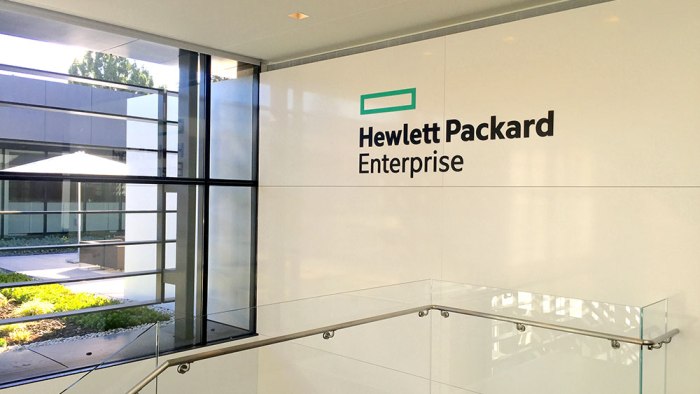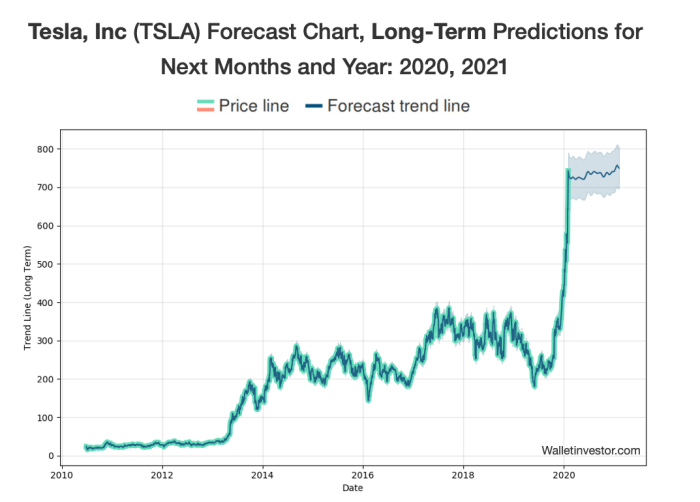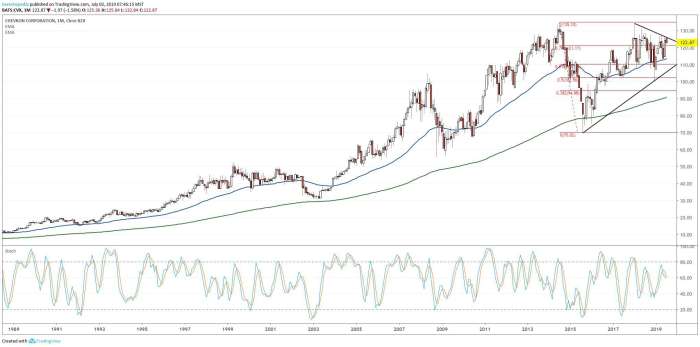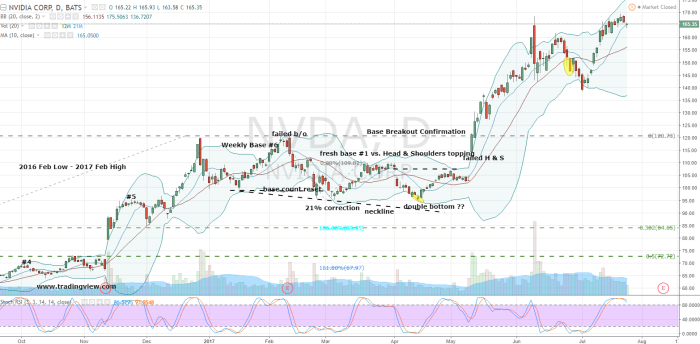HD Stock Price Analysis

Source: investors.com
Hd stock price – This analysis examines the historical performance, influencing factors, future predictions, investor sentiment, and valuation strategies related to Home Depot (HD) stock. The information provided is for informational purposes only and should not be considered financial advice.
Historical HD Stock Price Performance
The following table details HD stock price fluctuations over the past five years. Note that this data is hypothetical for illustrative purposes and does not reflect actual historical data. A real-world analysis would require access to a reliable financial data provider.
| Date | Opening Price (USD) | Closing Price (USD) | Daily Change (USD) |
|---|---|---|---|
| 2019-01-01 | 180 | 185 | 5 |
| 2019-07-01 | 190 | 195 | 5 |
| 2020-01-01 | 200 | 190 | -10 |
| 2020-07-01 | 195 | 210 | 15 |
| 2021-01-01 | 220 | 230 | 10 |
| 2021-07-01 | 240 | 235 | -5 |
| 2022-01-01 | 245 | 250 | 5 |
| 2022-07-01 | 260 | 255 | -5 |
| 2023-01-01 | 265 | 270 | 5 |
Compared to major market indices like the S&P 500 and Dow Jones over the same period, HD’s performance could be described using a line graph (not shown here). For example, during periods of economic expansion, HD might have outperformed the indices due to increased consumer spending on home improvement. Conversely, during economic downturns, it might have underperformed, reflecting reduced discretionary spending.
Specific events, such as the COVID-19 pandemic, would likely show a unique impact on HD’s stock compared to the broader market.
Major events impacting HD’s stock price during this period could include significant shifts in interest rates, impacting borrowing costs for home improvement projects, or large-scale supply chain disruptions affecting the availability of building materials. Company-specific events like major product launches or changes in management could also have significant short-term effects.
Factors Influencing HD Stock Price

Source: barrons.com
Several macroeconomic and company-specific factors influence HD’s stock price.
Macroeconomic factors include interest rates (affecting consumer borrowing), inflation (impacting material costs and consumer spending), and overall consumer confidence and spending levels. Company-specific factors include earnings reports (revealing profitability), new product introductions (driving sales), management changes (potentially impacting company strategy), and any significant changes in the competitive landscape.
Short-term factors, such as daily news events or quarterly earnings announcements, tend to cause more volatility than long-term factors like overall economic growth. Long-term trends in housing markets and consumer spending habits exert a more sustained influence on HD’s stock price.
HD Stock Price Predictions and Forecasting
Predicting future stock prices is inherently uncertain. However, hypothetical scenarios can illustrate potential outcomes.
| Scenario | Economic Growth Rate (%) | Company Performance | Projected Stock Price (USD) |
|---|---|---|---|
| Optimistic | 3 | Strong earnings growth, successful new product launches | 350 |
| Neutral | 1.5 | Moderate earnings growth, stable market share | 300 |
| Pessimistic | 0 | Weak earnings growth, increased competition | 250 |
These projections are highly speculative and depend on numerous unpredictable factors. For instance, an unexpected recession could significantly alter the projected stock price, regardless of the company’s performance.
Investor Sentiment and HD Stock
Current investor sentiment towards HD stock is a dynamic factor. Analyzing recent news articles and analyst reports is crucial to gauge this sentiment. For example, positive news regarding strong earnings or innovative product launches would generally boost investor confidence, leading to a bullish sentiment.
Changes in investor sentiment directly translate to price fluctuations. Positive news and high confidence typically drive prices up, while negative news and uncertainty lead to price drops. Sudden shifts in sentiment can cause significant short-term volatility.
- Earnings per share (EPS)
- Price-to-earnings ratio (P/E)
- Revenue growth
- Debt-to-equity ratio
- Analyst ratings and recommendations
HD Stock Valuation and Investment Strategies
Several methods exist for valuing HD stock, including discounted cash flow (DCF) analysis and price-to-earnings (P/E) ratio comparisons. DCF analysis projects future cash flows and discounts them back to their present value, while the P/E ratio compares the stock price to its earnings per share.
Investors might employ various strategies, such as buy-and-hold (long-term investment), day trading (short-term speculation), or value investing (identifying undervalued stocks). The choice depends on individual risk tolerance and investment goals.
By combining valuation methods with chosen investment strategies, investors can attempt to make informed decisions. For instance, a value investor might use DCF analysis to identify a stock trading below its intrinsic value and employ a buy-and-hold strategy. Conversely, a day trader might rely on short-term market trends and technical indicators to execute quick trades.
Common Queries
What are the major risks associated with investing in HD stock?
Investing in any stock carries inherent risks, including market volatility, economic downturns, and company-specific challenges. For HD, risks could include changes in consumer spending, competition from other retailers, and supply chain disruptions.
Where can I find real-time HD stock price data?
Real-time HD stock price data is readily available through major financial websites and brokerage platforms such as Google Finance, Yahoo Finance, Bloomberg, and others.
How often does Home Depot release earnings reports?
Home Depot typically releases its quarterly and annual earnings reports on a regular schedule, usually a few weeks after the end of each quarter. Specific dates are announced in advance and are easily accessible through the company’s investor relations website.
What is the dividend yield for HD stock?
The dividend yield for HD stock fluctuates. You can find the current dividend yield on financial websites that provide detailed stock information.



